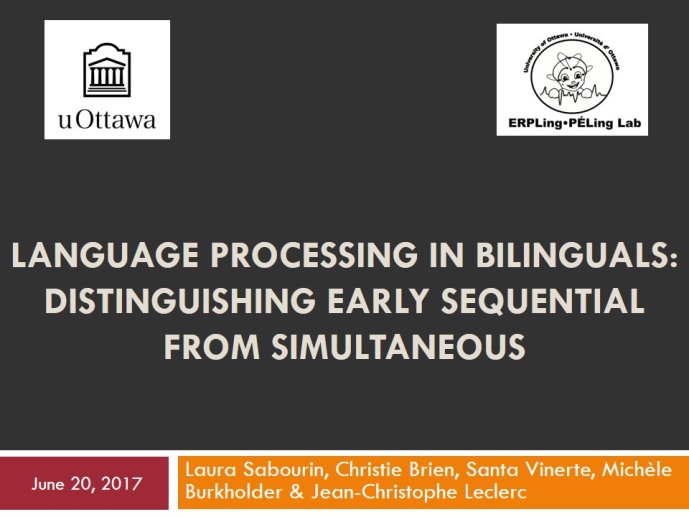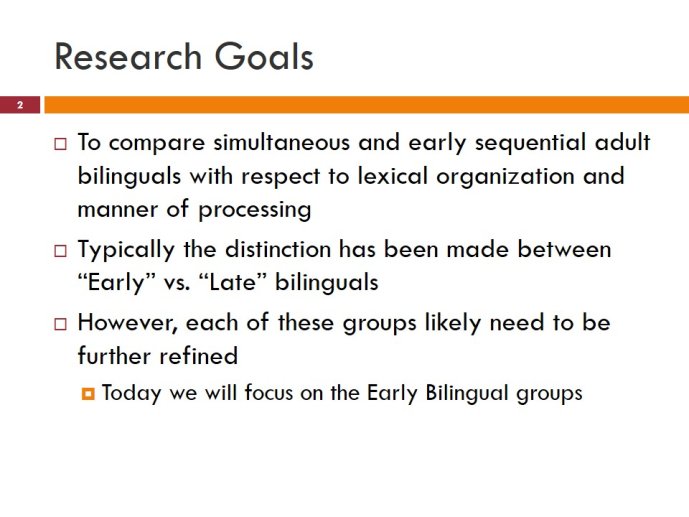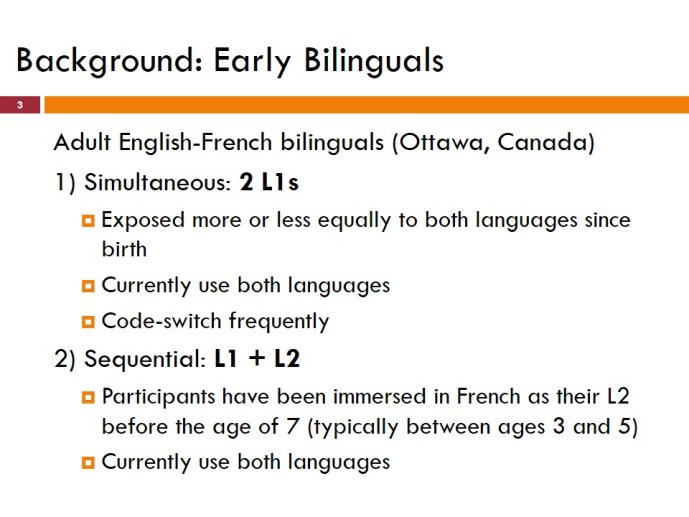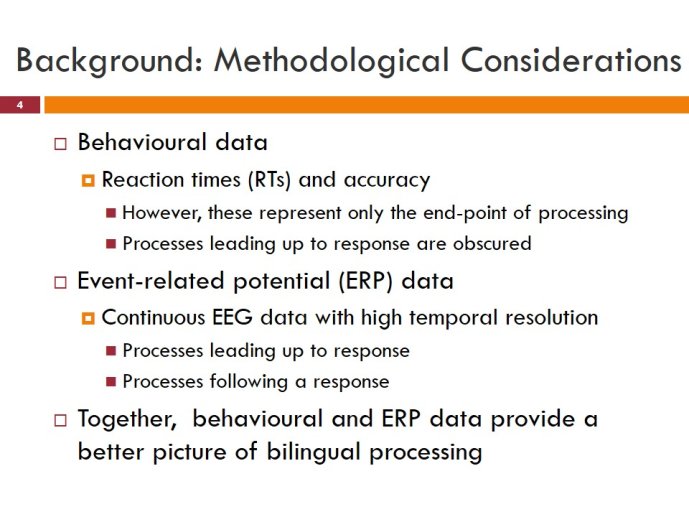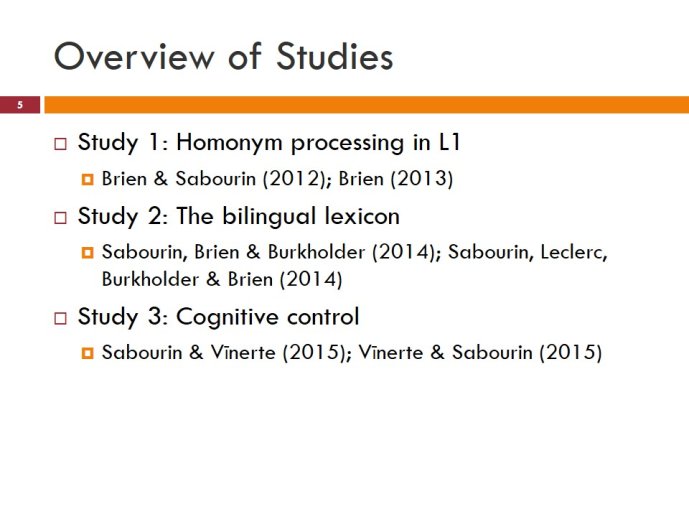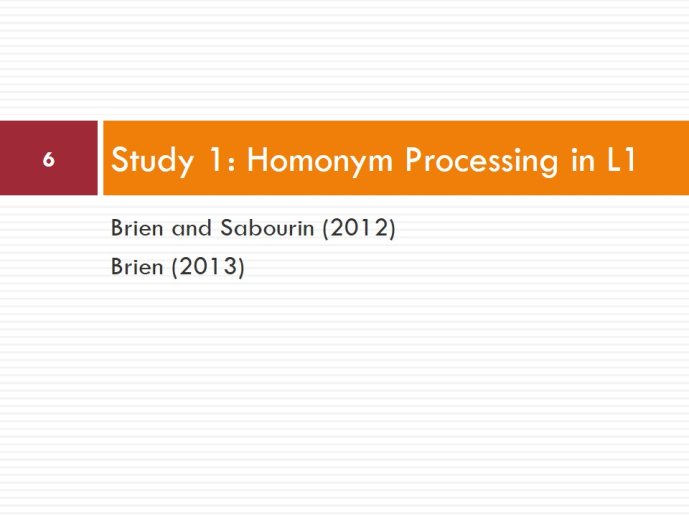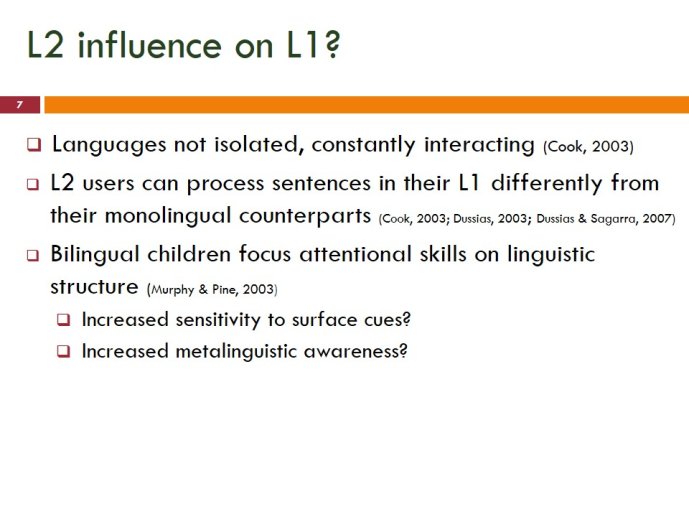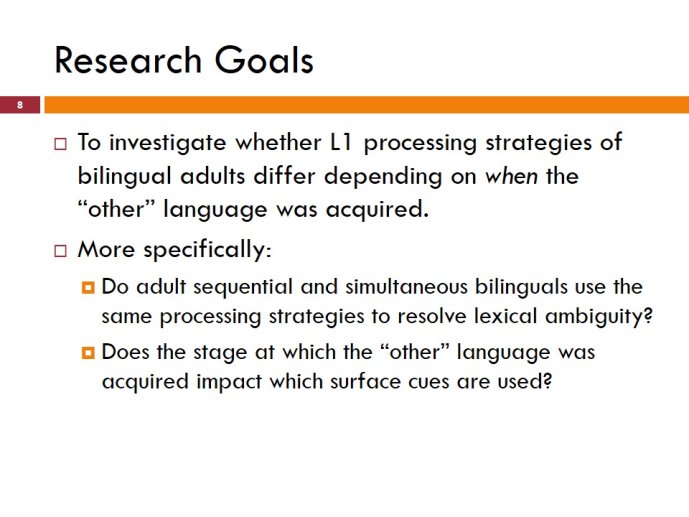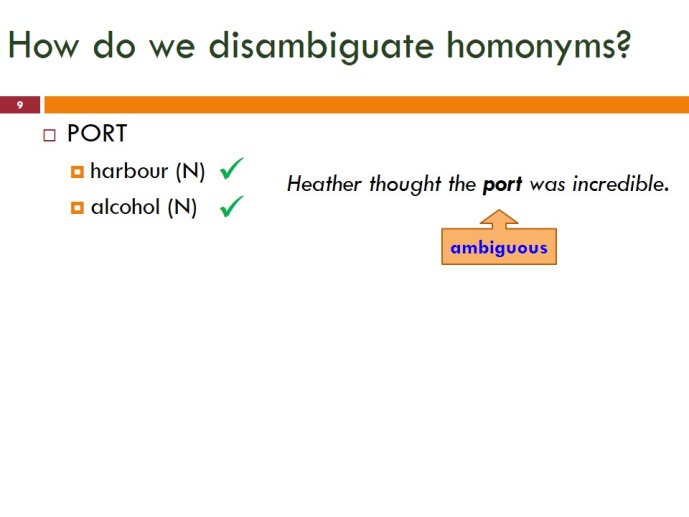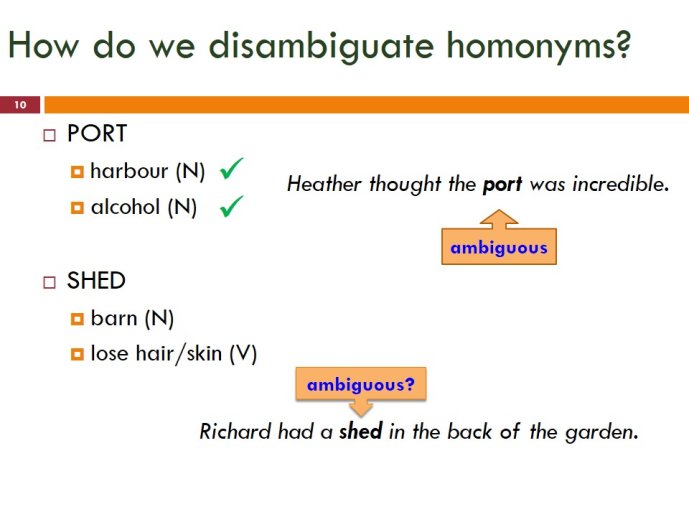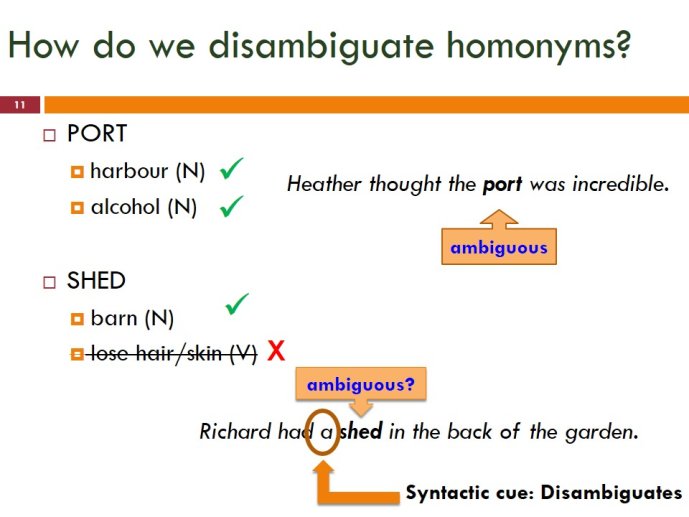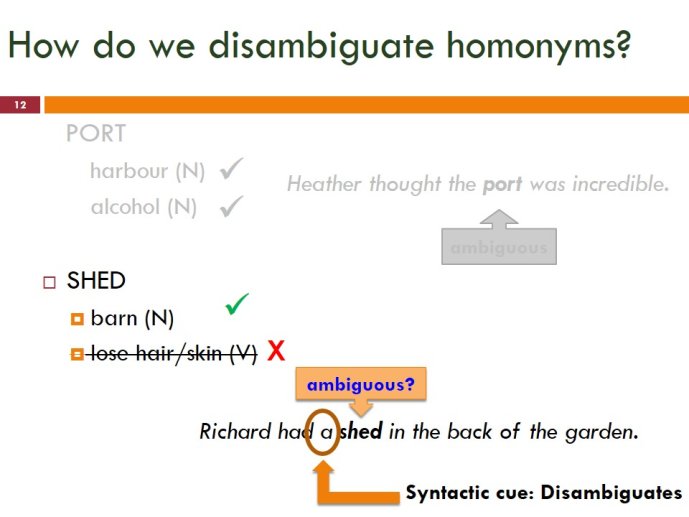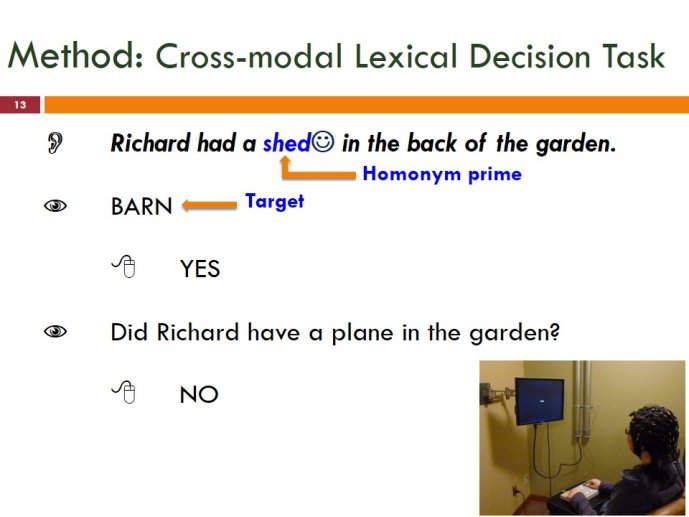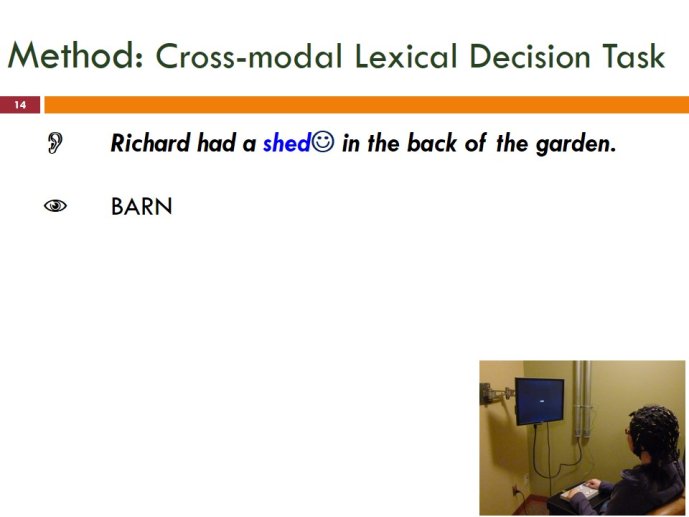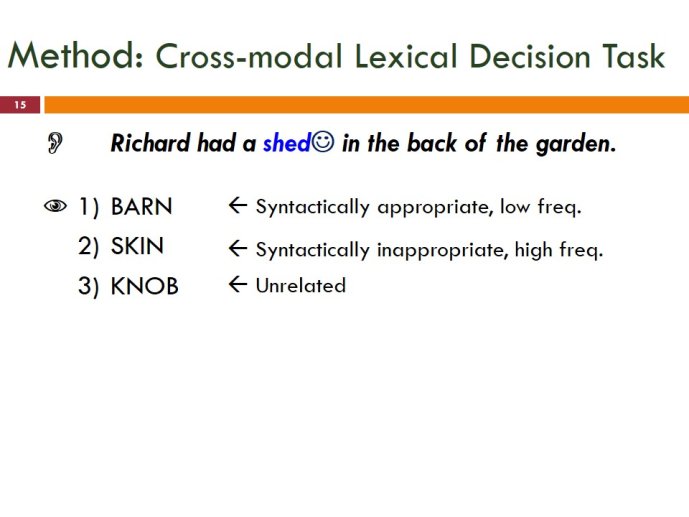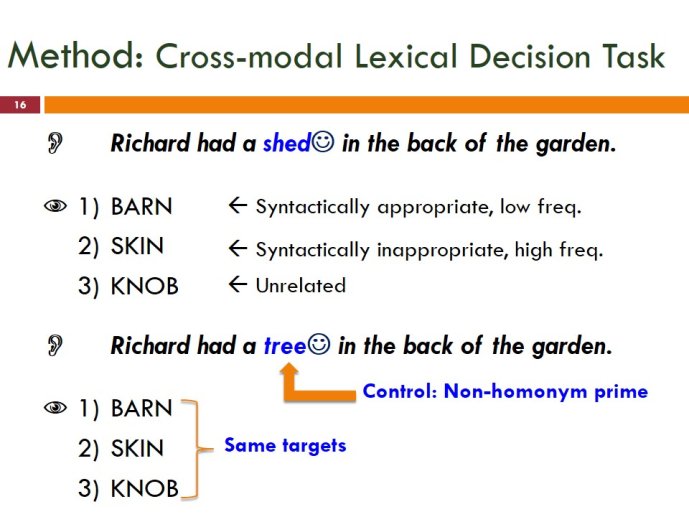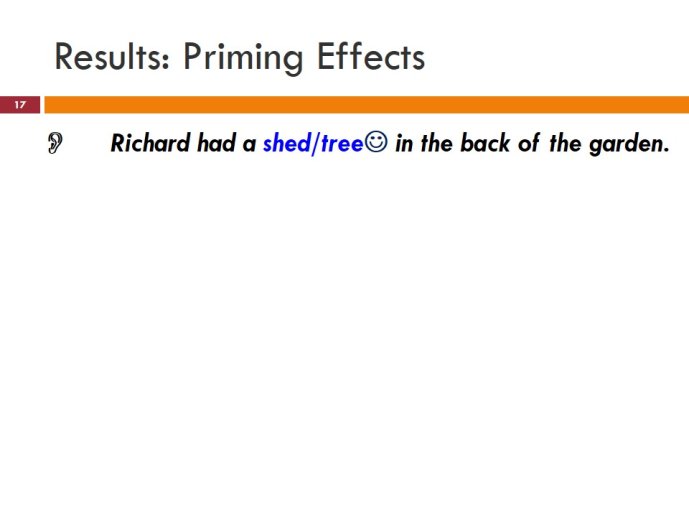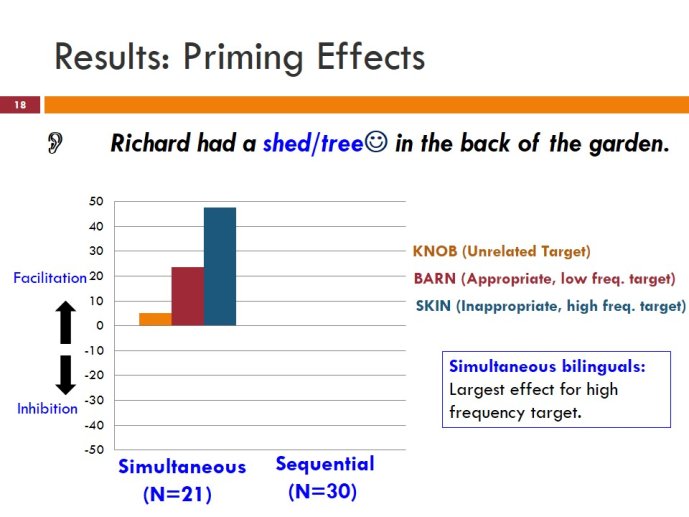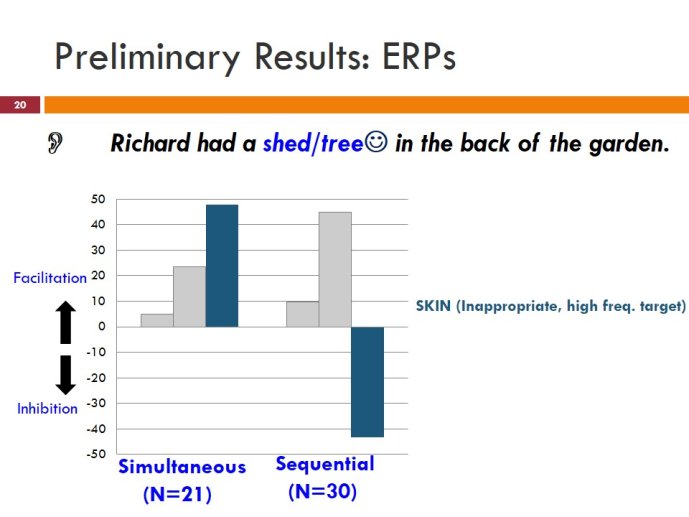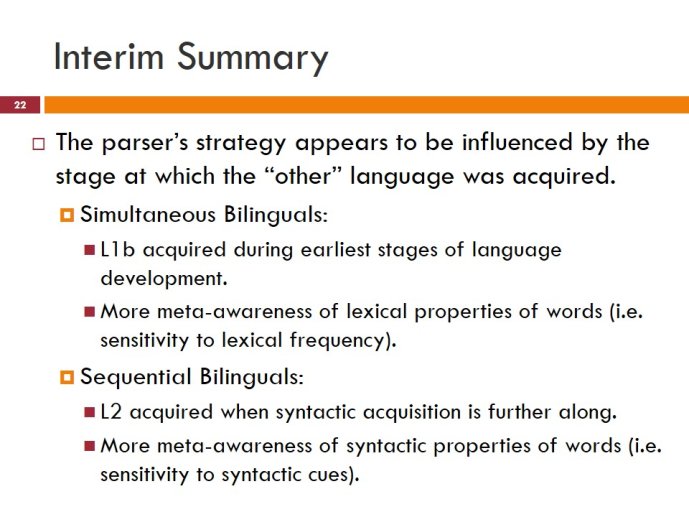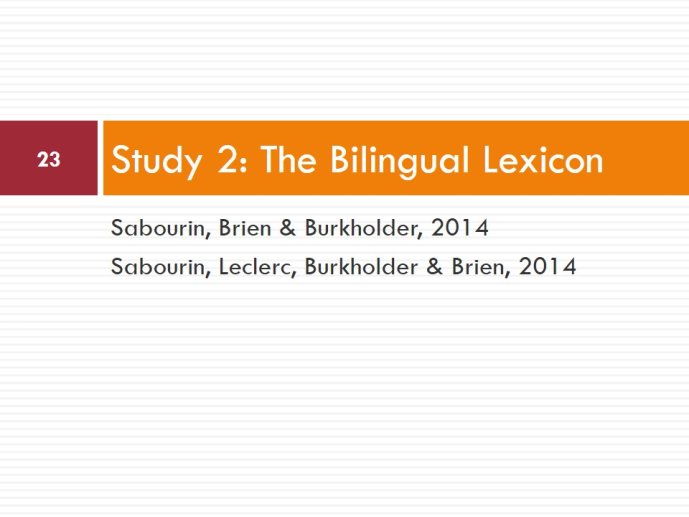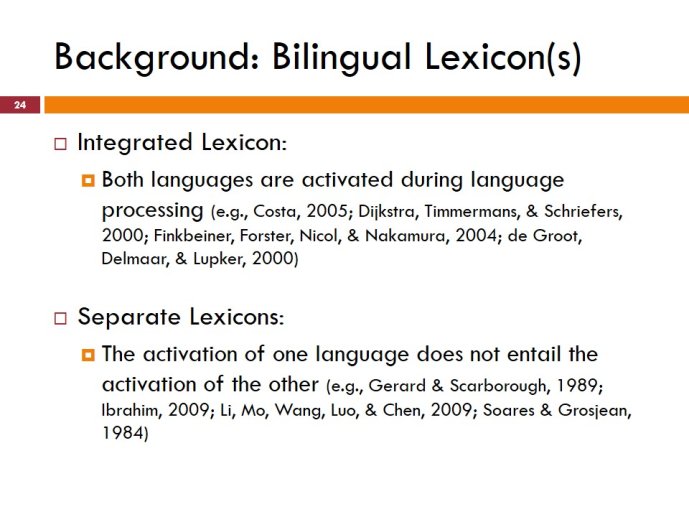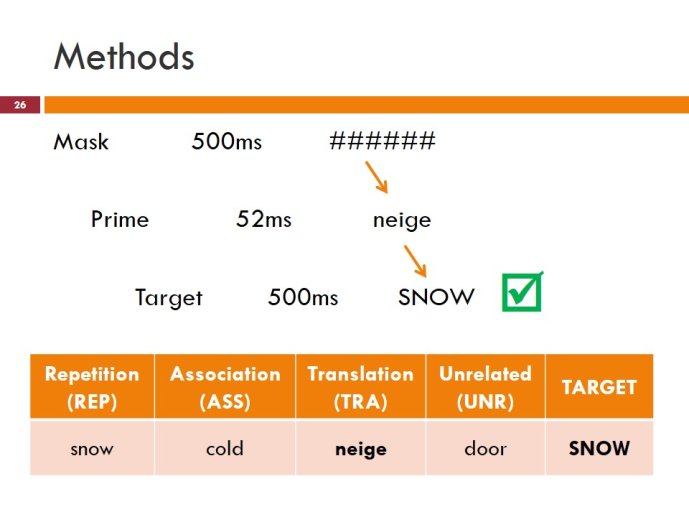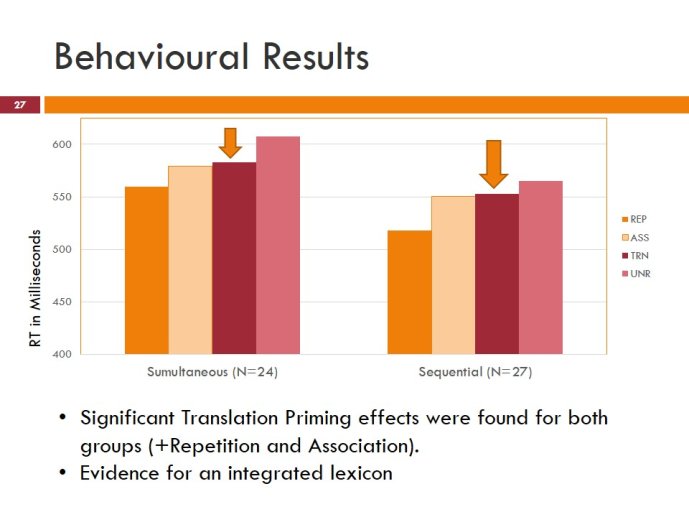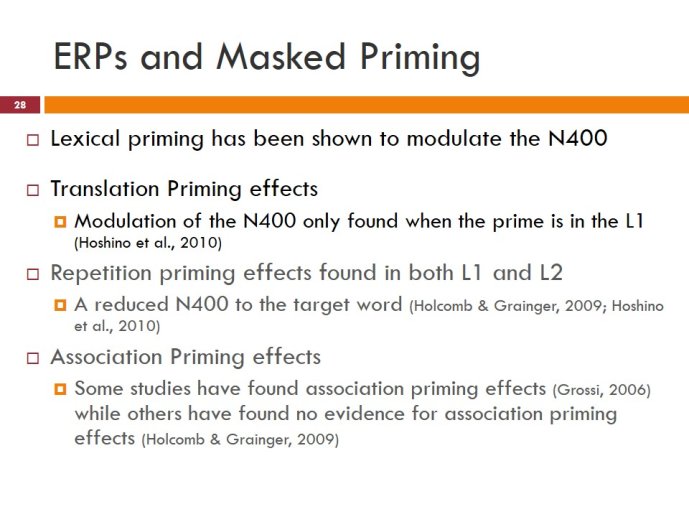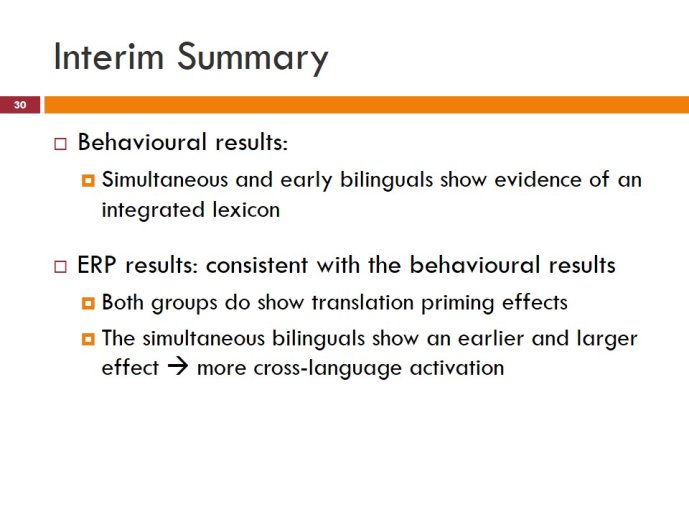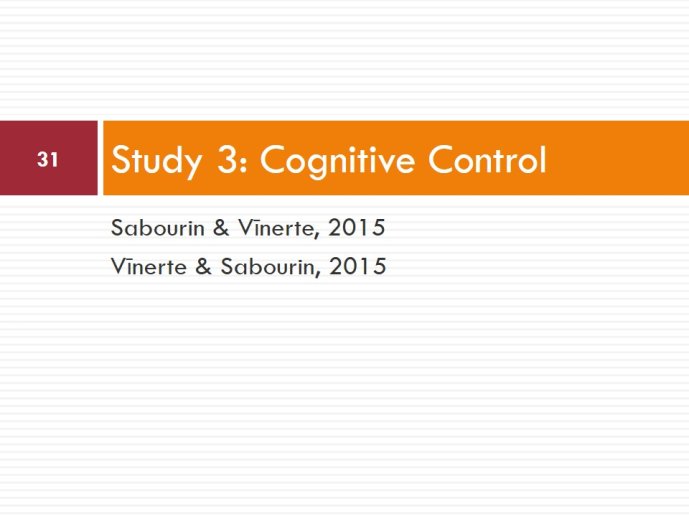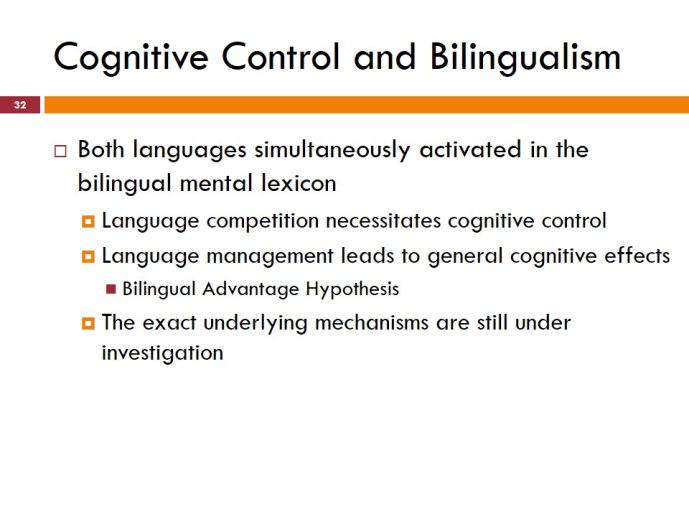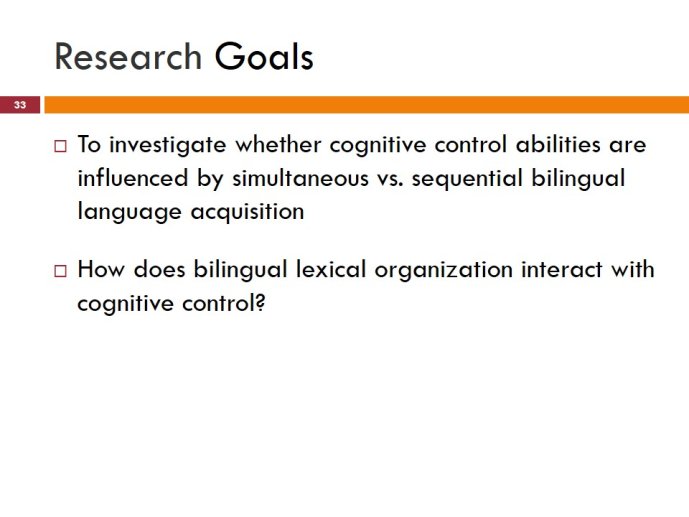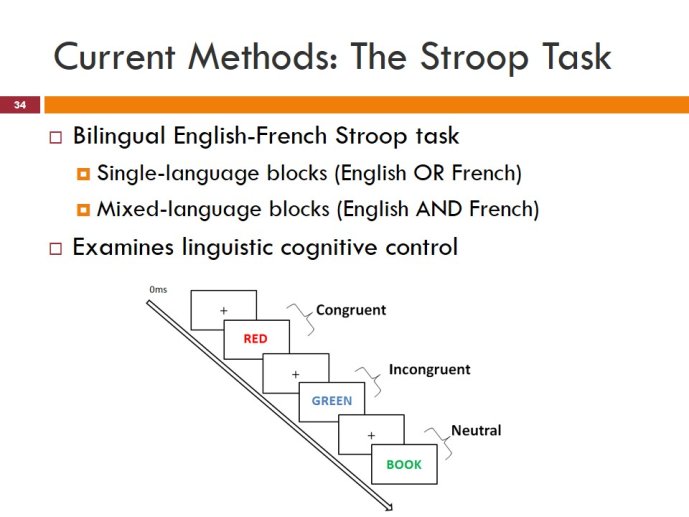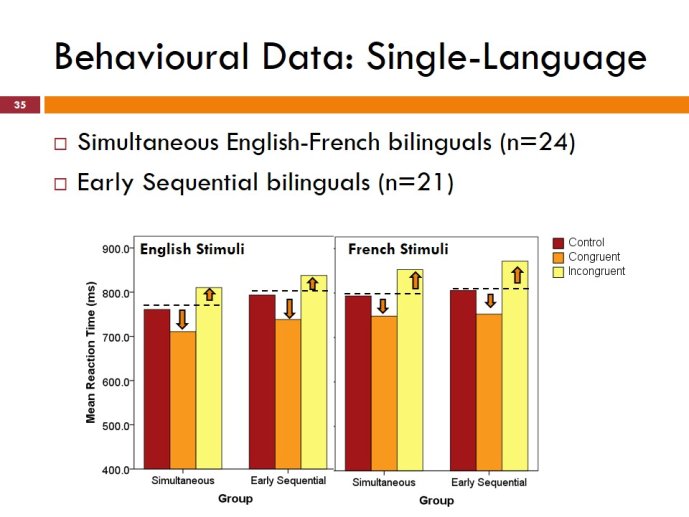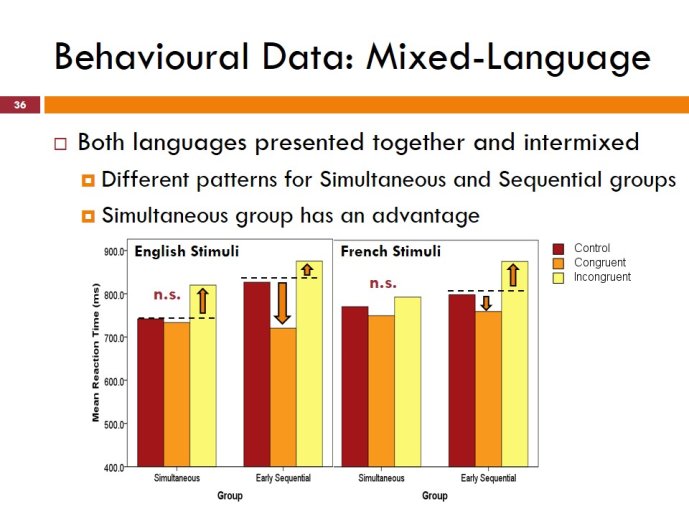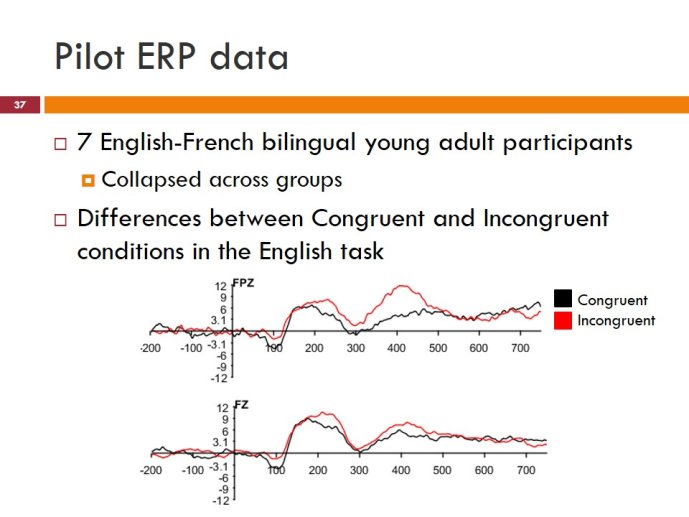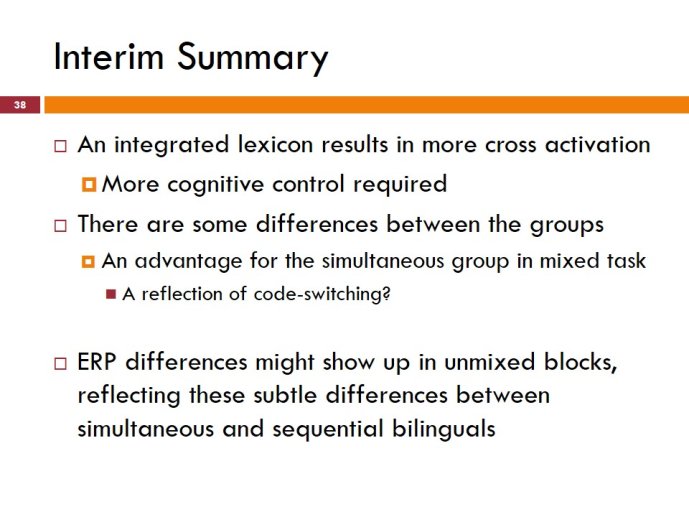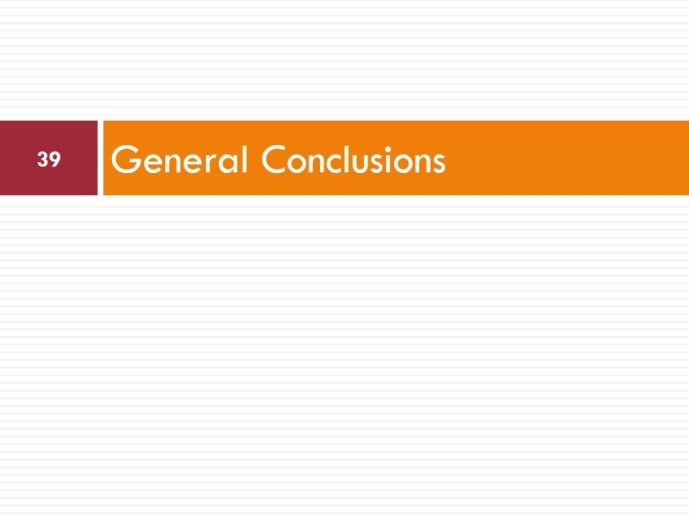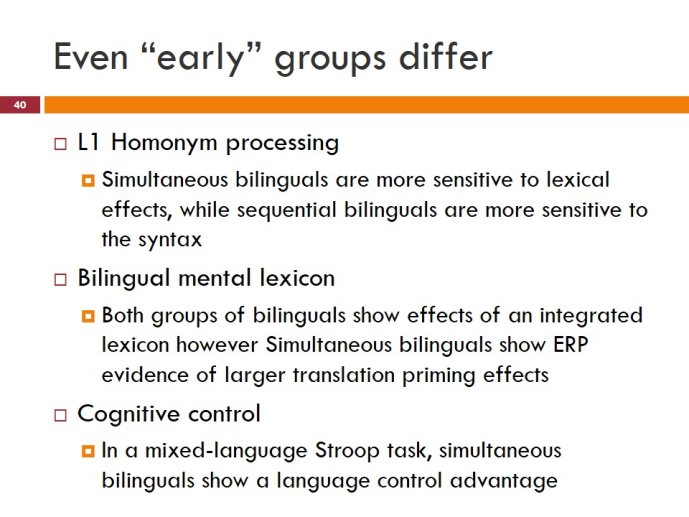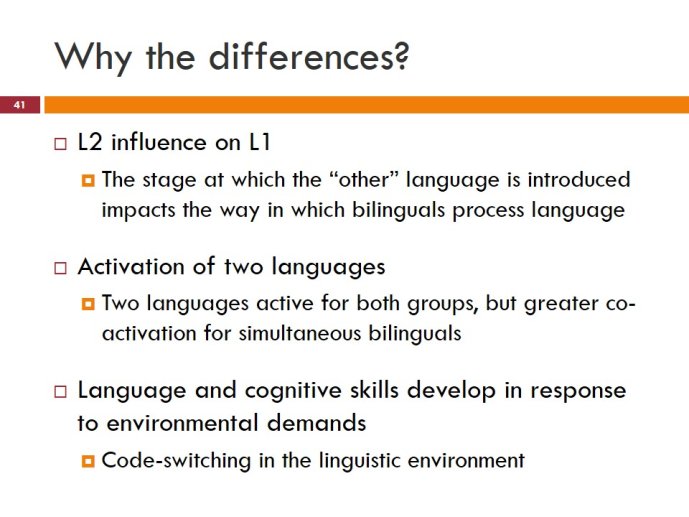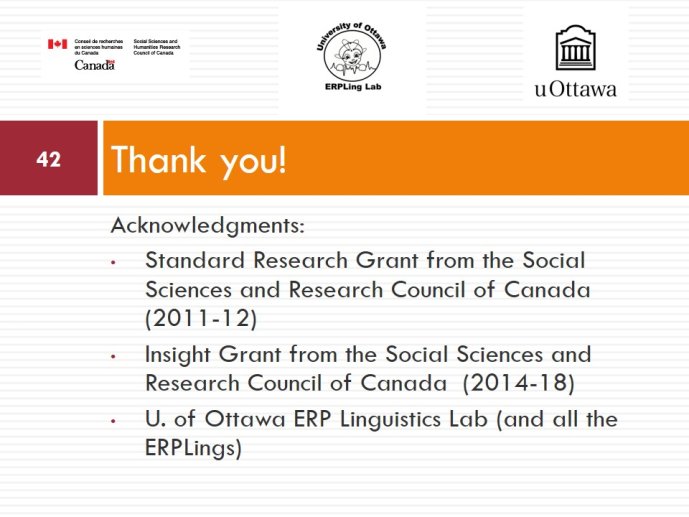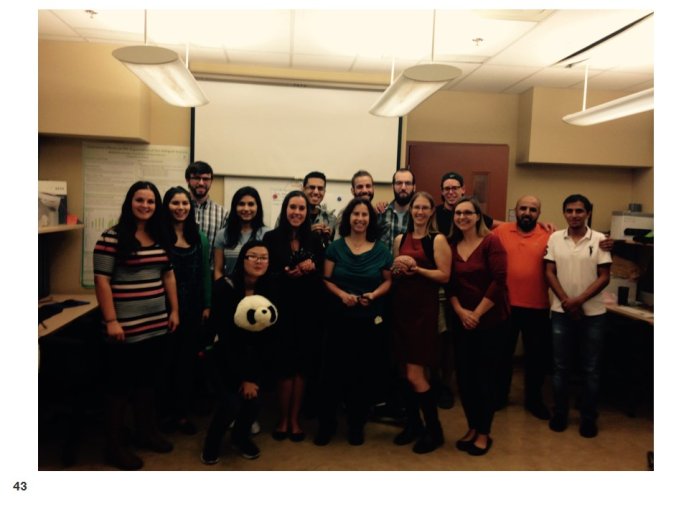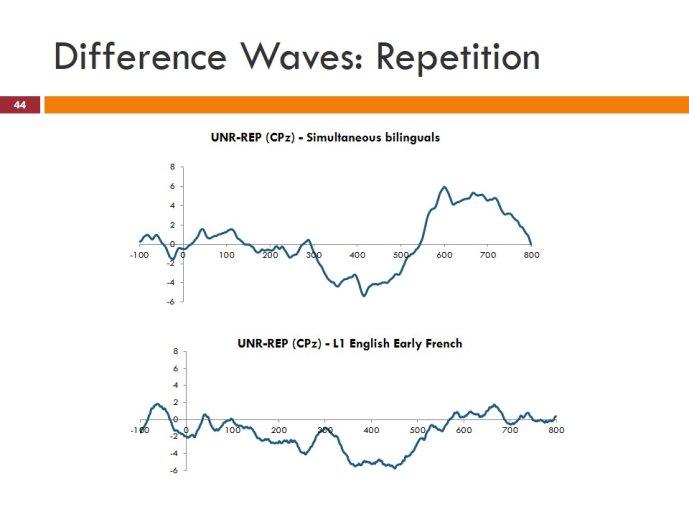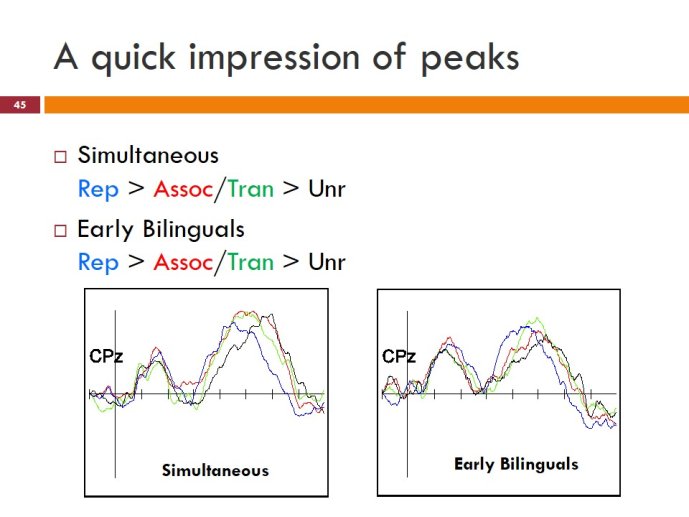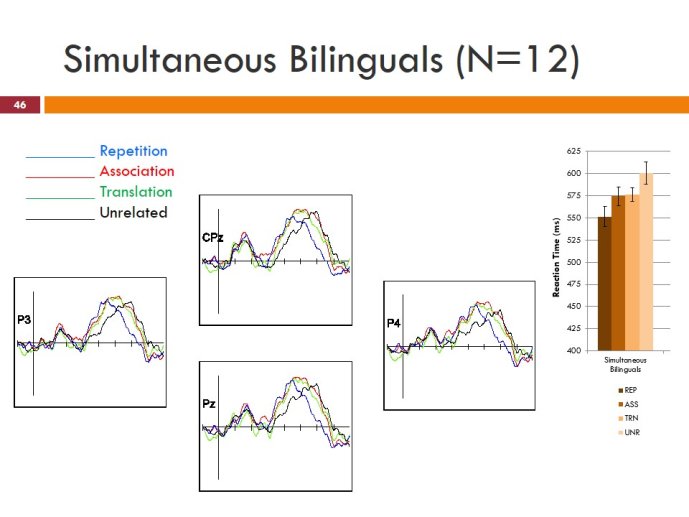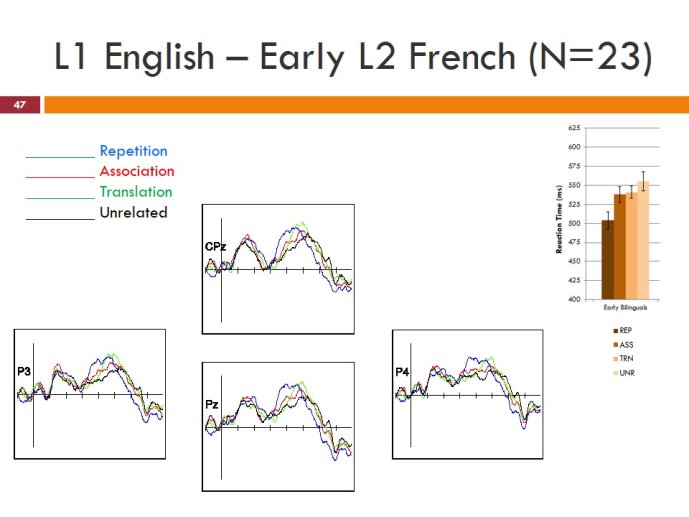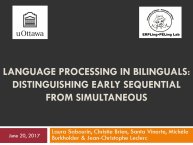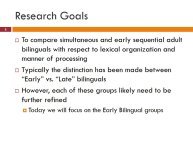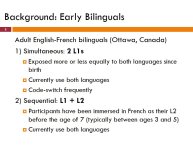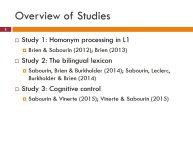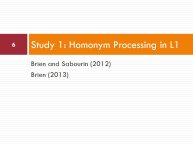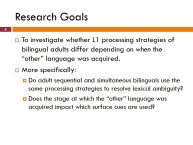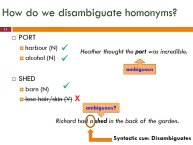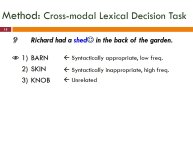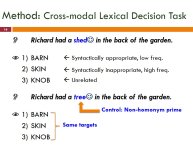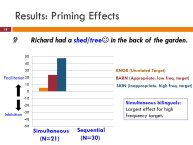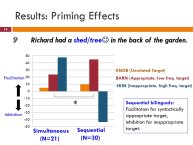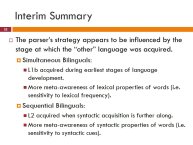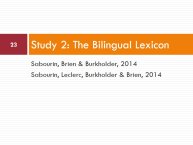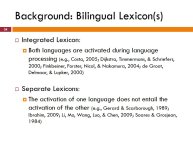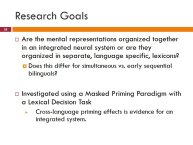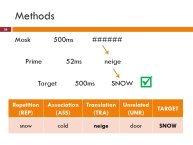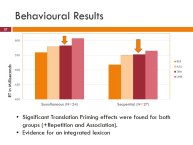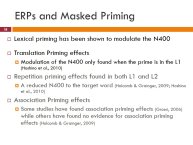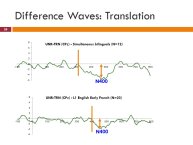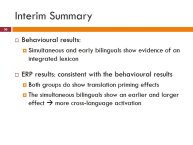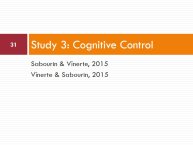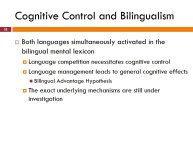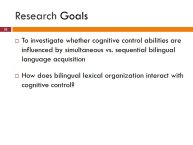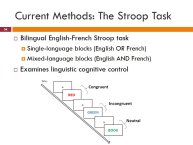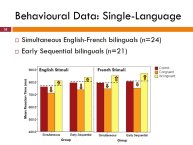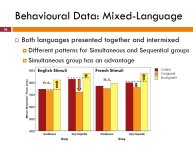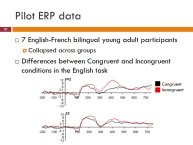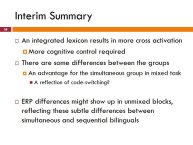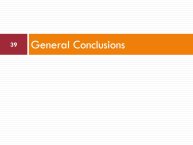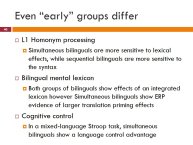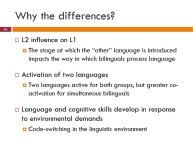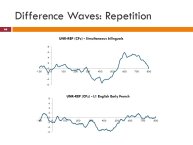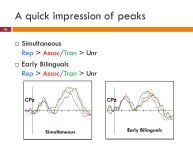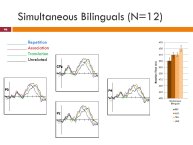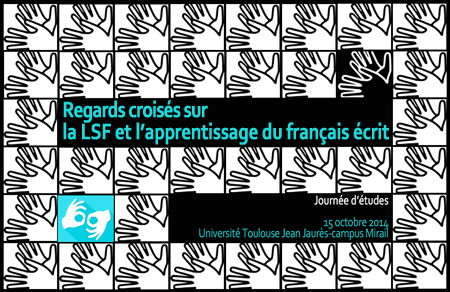Chapitres
Notice
Language Processing in Bilinguals: Distinguishing Early Sequential from Simultaneous / Laura Sabourin, Santa Vinerte
- document 1 document 2 document 3
- niveau 1 niveau 2 niveau 3
Descriptif
Language Processing in Bilinguals: Distinguishing Early Sequential from Simultaneous / Laura Sabourin, Santa Vinerte, in colloque "Bilingualism vs. monolingualism: a new perspective on limitations to L2 acquisition" organisé par le laboratoire Octogone-Lordat (Université Toulouse 2) sous la responsabilité de Barbara Köpke (UT2J), Holger Hopp (Technische Universität Braunschweig), Tanja Kupisch (Universität Konstanz), Université Toulouse Jean Jaurès, 19-20 juin 2017.
Many studies group simultaneous and early sequentialbilinguals together, but recent evidence suggests that these two groups performdifferently on varied processing tasks. Consequently, the goal of the currentresearch is to examine linguistic processing of early bilinguals and how thisrelates to the bilingual advantage hypothesis, by investigating the neuralsignatures involved in lexical level processing and cognitive control. We willconsolidate the results of three studies, which each compare behaviouralevidence from early sequential L1 English/L2 French bilinguals (AoA between age3 and 7), and simultaneous bilinguals. To further examine lexical processing,we have also collected event-related brain potential (ERP) data from a subsetof the participants Each study employed a different task: a Stroop task tomeasure cognitive control, a masked priming task to examine bilingual lexicalorganization and a cross-modal lexical decision task to test homonymprocessing.
Behavioural data from the Stroop task shows nodifferences between simultaneous and early bilinguals in a monolingualpresentation. However, when participants are faced with a bilingualpresentation, differences in facilitation and inhibition patterns emerge. Whileearly sequential bilinguals show facilitation in the L1 and interference in theL2, simultaneous bilinguals show interference in their dominant language. Tofurther investigate this, we are collecting ERP data to examine the time-courseand neural components during on-line processing.
Simultaneous and early bilinguals do not showsimilar cognitive control abilities, yet exhibit similar lexical organizationpatterns (suggesting an integrated bilingual lexicon) in the masked primingtask. However, given the results from another study whereby late bilingualswith a naturalistic Manner of Acquisition (MoA) also show evidence ofintegrated lexicons, this suggests that AoA is not the only determining factor.Interestingly, simultaneous bilinguals have the most naturalistic MoA, whileany sequential bilinguals, including early ones, have less naturalistic MoAwhich may explain the differences.
In a cross-modal lexical decision task investigatingsyntactic priming and frequency effects in the L1, simultaneous bilingualsshowed faster RTs overall, with longer latencies and more widespreaddistribution for N400-like effects for high-frequency words, suggesting asensitivity to both priming and frequency. In contrast, the early bilingualsshowed slower RTs overall and earlier N400-like effects suggesting a greatereffect of priming with no effect of frequency. These results suggest that dueto acquiring the L2 after the initial stages of L1 development that there areneural differences between simultaneous and early bilinguals.
Given these findings, it is clear thatdifferences exist even among early bilinguals, suggesting that, compared tobilinguals who acquire 2L1s simultaneously, early sequential bilinguals processtheir L1 differently due to having acquired an L2 while the L1 was still beingacquired and developed. The current research demonstrates this through a seriesof tasks using both behavioural and neurophysiological measures.
Thème
Documentation
Références bibliographiques
Caloi, Irene (2017). Additive focus particles in German-speaking learners of Italian as L2. In De Cesare, A. M., Andorno, C. M., Focus on additivity. Multiperspective and multifaceted views, Amsterdam, John Benjamins Publishing Company, 237-263.
Hernandez, Arturo E. (2009). Language switching in the bilingual brain: What's next?, Brain & Language, 109, 133-140.
Hofweber, Julia (2016). Effects of dense code-switching on executive control, in Irina A. Sekerina and Lauren Spradlin, "Bilingualism and Executive Function: An interdisciplinary approach", Linguistic Approaches to Bilingualism, 5, vol.6, 648–668.
Hopp, Holger & Schmid, Monika S. (2014). L'accent étranger perçu dans l'attrition L1 et l'acquisition de L2: l'impact de l'âge d'acquisition et du bilinguisme / Perceived foreign accent in L1 attrition and L2 acquisition, Psycholinguistique appliquée, 34 (2), 361-394. [En ligne : http://www.let.rug.nl/languageattrition/Papers/Hopp%20&%20Schmid%20forthc.pdf].
Kartushina, N., Frauenfelder, U. H. and Golestani, N. (2016), How and When Does the Second Language Influence the Production of Native Speech Sounds: A Literature Review, Language Learning, 52, vol. 66, 155–186. [En ligne : http://onlinelibrary.wiley.com/doi/10.1111/lang.12187/full].
Köpke, Barbara, Schmid, Monika (2011). L’attrition de la première langue en tant que phénomène psycholinguistique, Langage, Interaction and Acquisition / Language, Interaction et Acquisition (LIA), Amsterdam, John Benjamins Publishing Company, numéro spécial 2, vol. 2, 185-196.
Kupisch, T. (2012). Thèmes génériques en italien des premiers bilingues germano. Bilinguisme: Langue et Cognition 15 (4), 736-756.
Massa, E., Cortelazzo, F., El Yagoubi, R. & Köpke, B. (2016). Bilinguisme et contrôle exécutif : exploration neurofonctionnelle au moyen des méthodes potentiels évoqués et IRMf, Revue de Neuropsychologie, 2, 8, 126-136. {En ligne : http://www.jle.com/fr/revues/nrp/e-docs/bilinguisme_et_controle_executif_exploration_neurofonctionnelle_au_moyen_des_methodes_potentiels_evoques_et_irmf_307476/article.phtml].
Meisel, J. (2001). The simultaneous acquisition of two first languages. Early differenciation and subsequent development of grammars, in J. Cenoz & F. Genesee (éds.), Trends in Bilingual Acquisition, Amsterdam, John Benjamins Publishing Company, 11-41.
Meisel, J. (1989). Early differentiation of languages in bilingual children, in K. Hyltenstam & L. Obler (eds.), Bilingualism Across the Lifespan : Aspects of Acquisition, Maturity, and Loss, Cambridge, Cambridge University Press, 13-40.
Paradis, M. (2007). L1 attrition features predicted by a neurolinguistic theory of bilingualism, in B. Köpke, M. S. Schmid, M. Keijzer & S. Dostert (éds.), Language Attrition. Theoretical perspectives, Amsterdam, John Benjamins Publishing Company, 121-133.
Pérez-Leroux, A. T., Pirvulescu, M., & Roberge, Y. (2011). Topicalization and object omission in child language. First Language, 3, 31, 280-299. [En ligne : http://journals.sagepub.com/doi/pdf/10.1177/0142723710394384].
Royle, Phaedra, St-Denis, Ariane, Mazzocca, Patrizia, Marquis, Alexandra (2017). Insensitivity to verb conjugation patterns in French children with SLI, Clinical Linguistics & Phonetics. [En ligne : https://eoa.umontreal.ca/wp-content/uploads/sites/32/2017/07/publicationsRoyleP_verbConjugationPatternsFrenchSLI.pdf].
Rvache, S., Royle, P., Gonnerman, L. M., Stanké, B., Marquis, A., Herbay, A. (2017). Development of a Tool to Screen Risk of Literacy Delays in French-Speaking Children: PHOPHLO, Canadian Journal of Speech-Language Pathology and Audiology (CJSLPA), 3, vol. 41, 321-340. [En ligne : http://www.cjslpa.ca/detail.php?ID=1220&lang=en].
Sabourin, L. (2014). The bilingual advantage in the Stroop task: simultaneous vs. early bilinguals, in "L3 Acquisition: A Focus on Cognitive Approaches", Bilingualism: Language and Cognition, 2, vol. 18, 350-355.
Schmid, M.S. & Köpke, B. (2017). The relevance of first language attrition to theories of bilingual development. Linguistic Approaches to Bilingualism, 6, vol. 7, 637 –667 [En ligne : http://www.let.rug.nl/languageattrition/Papers/Schmid&Kopke2017.pdf].
Schmid, M S., Köpke, B., De Bot, K. (2013). Language attrition as a complex, non-linear development, International Journal of Bilingualism, 17 (6), 675-682.
Stoehr, A., Benders, T., Van Hell, J., & Fikkert, P. (2017). Heritage language exposure impacts voice onset time of Dutch–German simultaneous bilingual preschoolers, Bilingualism: Language and Cognition, 1-20. [En ligne : doi: 10.1017/S1366728917000116].
Stöhr, A., Akpınar, D., Bianchi, G., & Kupisch, T. (2012). Gender marking in L2 learners and Italian-German bilinguals with German as the weaker language, in K. Braunmueller & C. Gabriel (eds.), Multilingual Individuals Multilingual Societies, 153–170.
Van Osch, B. A., Aalberse, S. P., Hulk, A. C. J., & Sleeman, A. P. (2017). Knowledge of mood in internal and external interface contexts in Spanish heritage speakers in the Netherlands, in K. Bellamy, M. Child, M. C. Parafita Couto, P. González, & A. Muntendam (eds.), Multidisciplinary Approaches to Bilingualism in the Hispanic and Lusophone World, Amsterdam, John Benjamins Publishing Company, 67-94.
Dans la même collection
-
On Qualitative Differences between Types of Language Acquisition / Jürgen Meisel
MeiselJürgen M.On Qualitative Differences between Types of Language Acquisition / Jürgen Meisel, in colloque "Bilingualism vs. monolingualism: a new perspective on limitations to L2 acquisition" organisé par le
-
Monolingual and multilingual learners of French. What are the effects of language background on spe…
BontempsMarieMonolingual and multilingual learners of French. What are the effects of language background on spelling? / Marie Bontemps
-
Attrition and (incomplete) acquisition of Italian answering strategies / Irene Caloi
Attrition and (incomplete) acquisition of Italian answering strategies / Irene Caloi, in colloque "Bilingualism vs. monolingualism: a new perspective on limitations to L2 acquisition" organisé par
-
Do temporarily induced code-switching modes alternate executive performance in late sequential bili…
Do temporarily induced code-switching modes alternate executive performance in late sequential bilinguals?
-
Processing variability in L2 learning: insights from articulatory training / Natalia Kartushina, Cl…
Processing variability in L2 learning: insights from articulatory training / Natalia Kartushina, Clara Martin
-
Age-related effects on language control and executive control: a behavioral-electrophysiological in…
MassaÉmilieAge-related effects on language control and executive control: a behavioral-electrophysiological investigation / Émilie Massa
-
Language, Development and the Bilingual Brain / Arturo E. Hernandez
HernandezArturo E.Language, Development and the Bilingual Brain / Arturo E. Hernandez, in colloque "Bilingualism vs. monolingualism: a new perspective on limitations to L2 acquisition" organisé par le laboratoire
-
Trilingual effects at the microstructure and macrostructure levels in children’s narratives / Mihae…
PirvulescuMihaelaTrilingual effects at the microstructure and macrostructure levels in children’s narratives / Mihaela Pirvulescu, in colloque "Bilingualism vs. monolingualism: a new perspective on limitations to L2
-
Implicit causality as a predictive cue in child L1 and adult L2 processing of German: Evidence from…
Implicit causality as a predictive cue in child L1 and adult L2 processing of German: Evidence from visual-world eyetracking / Judith Schlenter
-
Cross-linguistic influence at the feature-level ? Evidence from Dutch-German bilingual preschoolers…
Cross-linguistic influence at the feature-level ? Evidence from Dutch-German bilingual preschoolers. How bilinguals are more monolingual-like than assumed / Antje Stoehr
-
Subject position in heritage Spanish in the Netherlands and the US: a case for cross-linguistic inf…
Subject position in heritage Spanish in the Netherlands and the US: a case for cross-linguistic influence / Brechje van Osch, in colloque "Bilingualism vs. monolingualism: a new perspective on
-
Can French-English bilinguals process verb-particle constructions in a native-like manner? A self-p…
Can French-English bilinguals process verb-particle constructions in a native-like manner? A self-paced reading study / Alexandre Herbay, in colloque "Bilingualism vs. monolingualism: a new
Sur le même thème
-
On Qualitative Differences between Types of Language Acquisition / Jürgen Meisel
MeiselJürgen M.On Qualitative Differences between Types of Language Acquisition / Jürgen Meisel, in colloque "Bilingualism vs. monolingualism: a new perspective on limitations to L2 acquisition" organisé par le
-
Attrition and (incomplete) acquisition of Italian answering strategies / Irene Caloi
Attrition and (incomplete) acquisition of Italian answering strategies / Irene Caloi, in colloque "Bilingualism vs. monolingualism: a new perspective on limitations to L2 acquisition" organisé par
-
Do temporarily induced code-switching modes alternate executive performance in late sequential bili…
Do temporarily induced code-switching modes alternate executive performance in late sequential bilinguals?
-
Processing variability in L2 learning: insights from articulatory training / Natalia Kartushina, Cl…
Processing variability in L2 learning: insights from articulatory training / Natalia Kartushina, Clara Martin
-
Language, Development and the Bilingual Brain / Arturo E. Hernandez
HernandezArturo E.Language, Development and the Bilingual Brain / Arturo E. Hernandez, in colloque "Bilingualism vs. monolingualism: a new perspective on limitations to L2 acquisition" organisé par le laboratoire
-
Implicit causality as a predictive cue in child L1 and adult L2 processing of German: Evidence from…
Implicit causality as a predictive cue in child L1 and adult L2 processing of German: Evidence from visual-world eyetracking / Judith Schlenter
-
Subject position in heritage Spanish in the Netherlands and the US: a case for cross-linguistic inf…
Subject position in heritage Spanish in the Netherlands and the US: a case for cross-linguistic influence / Brechje van Osch, in colloque "Bilingualism vs. monolingualism: a new perspective on
-
Can French-English bilinguals process verb-particle constructions in a native-like manner? A self-p…
Can French-English bilinguals process verb-particle constructions in a native-like manner? A self-paced reading study / Alexandre Herbay, in colloque "Bilingualism vs. monolingualism: a new
-
Transfer and derivational complexity in the wh-movement of heritage speakers and L2 learners: A bid…
Transfer and derivational complexity in the wh-movement of heritage speakers and L2 learners: A bidirectional study / Holger Hopp, in colloque "Bilingualism vs. monolingualism: a new perspective on
-
Bilinguismes et compliance phonique
JEP-TALN-RECITAL 2016 - Vendredi 8 juillet 2016 Session commune JEP/TALN 3 Bilinguismes et compliance phonique Marie Philippart de Foy, Véronique Delvaux, Kathy Huet, Myriam Piccaluga, Rima Rabeh and
-
Les catégories grammaticales dans la construction du bilinguisme
LauneyMichelLes catégories grammaticales dans la construction du bilinguisme (avec focus sur la catégorie de la personne
-
Spécificités structurelles et typologiques des LS, langues de l'oralité, et accès des sourds à la l…
GarciaBrigitteSpécificités structurelles et typologiques des LS, langues de l'oralité, et accès des sourds à la littératie / Brigitte Garcia, in "Regards croisés sur la LSF et l'apprentissage du français écrit",

